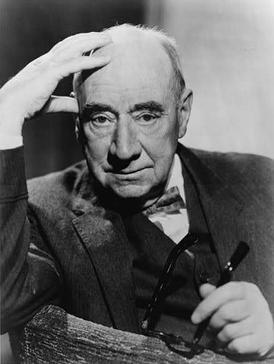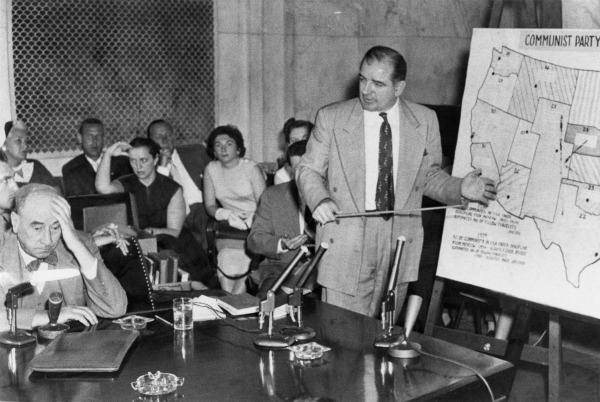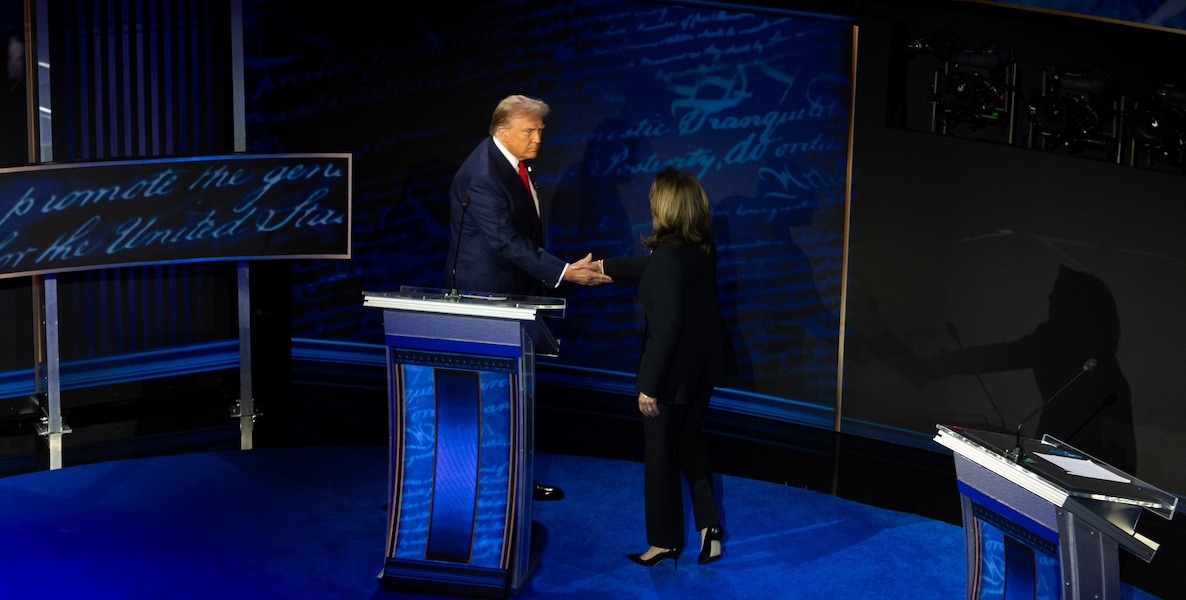My late father did one impersonation. He was a proud member of the Greatest Generation — dropped out of Temple during World War II to enlist, and bragged that he protected the shores of Seattle from Japanese attack. So you might think he’d imitate Jerry Lewis — the Dave Chapelle of his day — or, I don’t know, Sinatra, that generation’s Taylor Swift.
No, Dad’s one impression was of Joseph Welch. Never heard of him? Not surprising. In the 1950s, Welch had precisely one moment when the eyes of the country were upon him, but how he handled it just might have rescued democracy in the 20th Century. Welch was the Boston attorney whose morally indignant takedown of that generation’s demagogue on national TV changed history by appealing to the better angels of America’s nature.

That purveyor of tyranny was Sen. Joe McCarthy of Wisconsin, whose lies about Communist ties everywhere from Hollywood to the State Department ruined countless lives and fueled a culture of fear and loathing in public life. But then he took on the U.S. Army, which hired Welch as its special counsel for the nationally televised Army-McCarthy hearings.
On June 9, 1954 the whole country looked on as McCarthy made another of his baseless charges, accusing a young man on Welch’s staff of having Communist ties. Keep in mind that, until this moment, the nation’s entire establishment — Presidents Truman and Eisenhower, Senator Kennedy, titans of industry — had cowered before the lies of this charlatan, who had accused scores of American citizens of being traitors without ever producing a scintilla of evidence. He was an expert at the Big Lie, and, it should be noted, his top aide — the odious Roy Cohn — would go on to mentor none other than Donald Trump in the New York of the 1970s.
But when, during the 36-day Army-McCarthy hearings, the senator did what autocratic bullies do — going after a powerless target in order to, by proxy, continue terrorizing the powerful — one man would have none of it.

That’s who Dad impersonated. I heard it throughout my youth, a kind of family joke. Dad was doing Joseph Welch again. There was nothing distinct about the voice save its precise enunciation, which hinted at moral rectitude.
“Until this moment, Senator, I think I never really gauged your cruelty or your recklessness,” Welch said. When McCarthy tried to continue his attack, Welch angrily interrupted: “Let us not assassinate this lad further, senator,” he said. “You have done enough. Have you no sense of decency, sir? At long last, have you left no sense of decency?”
In 14 seconds, McCarthy’s reign of terror was cut short. Almost overnight, his popularity plummeted. As the hearings concluded, this one-time self-professed paragon of strength seemed small and sputtering. Soon, he was censured by the Senate, ostracized by his party, and ignored by the same press that had made him a household name. McCarthy died three years later, his reputation in tatters, at all of 48 years old.
Truly American values
It remains to be seen what the effect of Kamala Harris’ debate evisceration of Trump will be, but — separate and apart from all considerations of policy and politics — it had the feel of a Welch-like moral smackdown, no? Finally, someone was standing up to the bully who — of course — turned out to have a glass jaw.
Harris baited the old man, and he fell for it, every time. Finally, after a decade of Trump dictating the discourse, someone was not afraid to reiterate time and again that there are such things as American values — the Golden Rule, neighborliness, warmth, curiosity — and that the scowling candidate peddling lies about immigrants eating dogs and Democrats favoring the killing of newborns doesn’t share them.
Now, we should note: This is not partisan. In fact, there are policies I’ve praised Trump for. His tax cut wasn’t the evil giveaway to the rich that progressives claim; it actually benefited middle and working class Americans the most. (That said, his corporate tax cuts should have included a mandate or incentive to reinvest in workforce, as opposed to just fueling stock buybacks.) He deserved credit for the Abraham Accords and for the miraculous development of a Covid vaccine — though, for fear of arousing the ire of his base, he’s loath to claim credit for that one.
“As a prosecutor I never asked a victim or a witness, Are you a Republican or a Democrat? The only thing I ever asked them, Are you okay? And that’s the kind of president we need right now. Someone who cares about you and is not putting themselves first.” — Vice President Kamala Harris
And this isn’t to argue that Harris is the next coming of The Natural. When Obama ran in ’08, his campaign manager would receive middle of the night phone calls from former President Bill Clinton, reminding him that the campaign that is about the future is the one that wins the Resolute desk. Harris has talked about the future in the most generic of ways, but has she laid out any plans or a vision? (Clinton published an entire book — Putting People First — that laid out not only a philosophy of governing, but a step-by-step program for how to make ultimately progressive change.)
No, like Welch’s takedown of McCarthy, the takeaway of this week’s debate goes beyond politics. Harris didn’t use the word “decency” but time and again she devastatingly portrayed Trump as not one of us. Quite ironically, she othered him, only her standard of demarcation was not race or class or national origin, but our once agreed-upon rules of social interaction.
Trump isn’t like us because he doesn’t act the way we were raised, doesn’t treat others with the same dignity and respect we extend and expect to receive in turn. (It’s reminiscent of this great Jordan Klepper exchange on The Daily Show at a Trump rally, where he asks those who shrug off Trump’s sexism as mere “boys will be boys” locker room talk if their sons or their pastors or their husbands speak that way. “So not every boy,” Klepper deadpans).
We have, all of us, normalized Trump. By bringing Welch-like moral judgment to bear, Harris refused to play along. “And I’m going to tell you that I have traveled the world as Vice President of the United States,” she said, looking directly at a scowling Trump who wouldn’t dare return her gaze. “And world leaders are laughing at Donald Trump. I have talked with military leaders, some of whom worked with you. And they say you’re a disgrace.”
Booyah. While Trump devolved into childish name-calling (Harris is “Marxist,” Biden a “weak, pathetic man”), the best character reference he could trot out during this job interview was the Hungarian autocrat Viktor Orban. Meanwhile, Harris, Welch-like, appealed to common values: “I’ve only had one client. The people. And I’ll tell you, as a prosecutor I never asked a victim or a witness, Are you a Republican or a Democrat? The only thing I ever asked them, Are you okay? And that’s the kind of president we need right now. Someone who cares about you and is not putting themselves first.”
She spoke of a “lethal fighting force” (this is a Democrat?) while Trump couldn’t even bring himself to say he’s on Ukraine’s side in its war against Putin’s expansionist thuggery. Domestically, she rallied toward common cause with lines like, “We see in each other a friend, we see in each other a neighbor.”
There will be much discussion as to whether Harris’ performance moves the polls in her favor. If it does, might it open an even greater possibility? Her unmasking of Trump was akin to the way the great and powerful Wizard of Oz was revealed to be neither great nor powerful. Sure, the hard core, conspiracy-laden Trump crowd will stand by their man, like an army of Tammy Wynettes. But what of the legions of Republicans who know better? Isn’t it that much harder now to deny that, like Oz, Trump is just another con man? In the same way Biden was revealed to be unfit, we now have Trump, shrunken in size.
There are still reasonable Republicans — senate candidate David McCormick, Congressman Brian Fitzpatrick, senate candidate Curtis Bashaw in Jersey — but thanks either to the threat of MAGA primary challenges or of engendering Dear Leader’s wrath, they’ve had to be more Cowardly Lion than profile in courage. Now that Trump has been exposed, maybe it’s a first step toward rebuilding a much-needed Republican party? After all, all the guy does is lose at the polls, when you think of it. The 2018 midterms, the 2020 General, the 2022 midterms, the majority of his endorsed candidates, every reproductive health referendum. How long do those who know better stick with him?
I know, I know. Conventional wisdom has entertained the notion that the Trump fever may break many times before. As far back as a decade ago, when Trump questioned Sen. John McCain’s war hero status, we thought he was done; ditto four years ago, in the aftermath of the insurrection the defeated incumbent ignited.
But at the end of this week’s debate — and in the spin room afterwards — something felt different. Trump looked like Matthew Harrison Brady, the character based on William Jennings Bryant in that last courtroom scene of Inherit The Wind, Hollywood’s version of the Scopes trial: broken, old, defeated. That scene still gets to me for the same reasons Harris’ dismantling of Trump strikes a chord: For its reverence of Welch-like Enlightenment values, and its implication that progress just might be inevitable, but only after we’ve exhausted every other possible option.
![]()
MORE ON THE 2024 PRESIDENTIAL RACE



